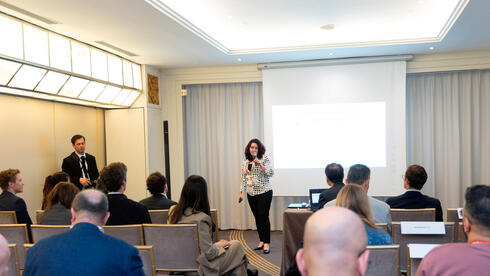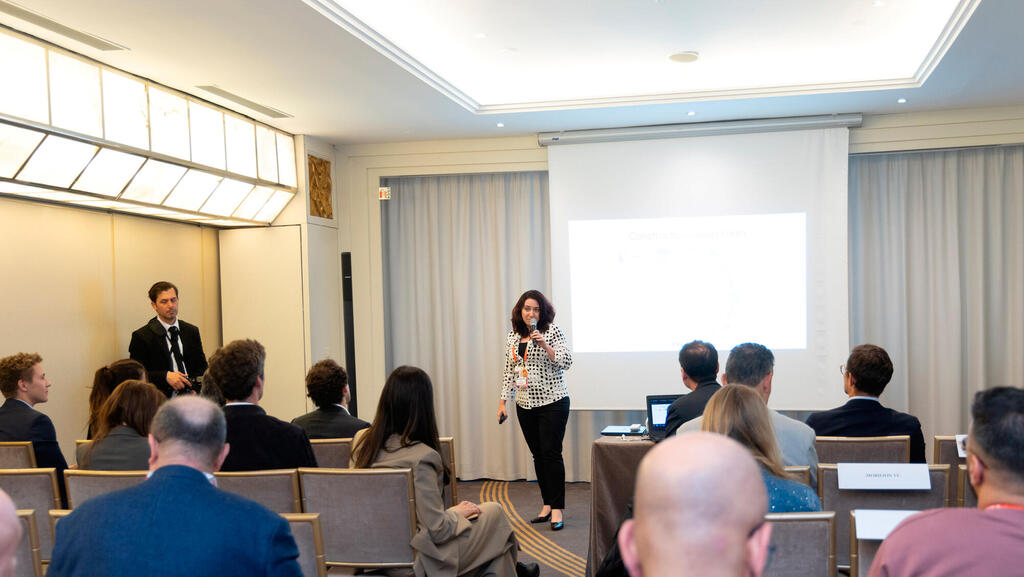
Paris 2024
Export Institute CEO: "Israeli innovation speaks louder than anything else"
"Despite the situation, we managed to bring in funds that are interested in investing in Israel," said Nili Shalev at a round table organized by the Export Institute as part of the Calcalist and Bank Hapoalim business delegation to Paris.
More than 10 Israeli startups presented their companies to representatives of European venture capital funds as part of a round table organized by the Export Institute during the tour of the Calcalist and Bank Hapoalim business delegation in Paris. The event was moderated by Gal Mor, Israel's economic attaché in France, who spoke about the need to promote trade relations between Israel and France and attract investments from France to Israel.
"It took us quite some time to map out which French funds are ready to invest in Israel and which have already invested and bring them here," Mor said. "We are competing for the time of the French funds, especially at this time of the VivaTech exhibition where 9,000 startups from all over the world come to Paris. And we still managed to bring large funds here and we heard of a huge interest from them. Almost all of them said that as soon as the situation in Israel made it possible, they would come, and until then they will continue to keep in touch from afar, because they are very impressed by the Israeli companies. The approach of the Israeli start-ups, who from the beginning look at the global market and not at the local one, unlike French companies for example, is very pleasing to the investors here, since they see companies that are directly focused on growth, from their first day. They are very satisfied with the level and the opportunity they received here. I am sure that there will be inquiries from investment funds that came here today about Israeli startups."
Thomas Visan, representative of the French venture capital fund Sienna Ventures, spoke with the Israeli entrepreneurs and shared with them the fund's world view on investments in Israel. "We have invested in more than 60 Israeli companies," Visan said. "We are very interested in meeting Israeli entrepreneurs and hearing about them. One of the reasons we invested in Israel at the beginning was that Israel was considered a gateway to the American market. But things are changing and Israel has become a significant market in its own right."
The Israeli startups that presented to the French funds came from a wide range of fields, from cleantech to AI-based digital marketing. Luminescent CEO Doron Tamir talked about the experience of the company under his management to convert heat to energy and vice versa with zero loss along the way, in what he says "paves a new way to produce energy" that will be reflected in many products such as pumps and air conditioning systems.
Tamara Mumcuoglu, CEO of EVA, presented the idea behind the start-up under her management: "The growth of the population continues at the highest rate in history. This growth and its need for housing comes at a price. In the supply chain of development and construction, a great many pollutants are released into the air. We at Eva try to reduce the pollution that accompanies the production of cement and concrete. We reduce the carbon footprint in the production chain."
Dvir Kenig, the owner of the start-up ITC, spoke about one of the urban problems that bothers residents in every major city in the world - traffic jams. "This problem creates heavy costs for every household," Kenig said. "The number of cars continues to grow faster than the infrastructures that are unable to accommodate them. Our solution is smart transportation management. We try to regulate the congestion even before it occurs using technology that studies the patterns of transportation and creates solutions for them."
Another startup presented was 6Degress managed by Miri Berger, which mobilized the technology to address the problem of rehabilitation of people with disabilities. Berger said that the company was founded by her and her husband, who himself was injured during his military service. "We mobilized the technology to make the rehabilitation procedure a less difficult experience. In the research we performed, we saw that 88% of the patients in our system reported an improvement in how they felt. During a presentation of our system at a conference in Palo Alto last month, a patient treated with the system said he had "the most fun in a long while".
After the presentation of the companies was over, the representatives of the companies turned to talk individually with the representatives of the funds that expressed interest in their startups. At the end of the event, Nili Shalev, CEO of the Export Institute, commented on the attempt to bring Israeli start-ups to France during the war. "We do a lot of business activity outside of Israel. People are afraid to come to Israel, but here, together with the affiliates, we were able to bring funds that are interested in investing in Israel and I hope that this will create connections and interest in hearing more about these companies. From our data, the business activity of the Export Institute outside the borders of Israel continues at full strength. So it is true that there are concerns, but we continue to operate and there is interest in the technology. In the end, Israeli innovation speaks louder than anything else.”
Dr. Adi Horowitz Lavie, Vice President of Investments and Growth at Poalim Tech, who was present at the event, concluded: "Precisely during a crisis, the unique feature of the Israeli high-tech industry is revealed - entrepreneurial self-sufficiency. With the decrease in investments and demand, entrepreneurs find themselves looking for new markets to raise funds and collaborations beyond the US, which used to be the main market to which the industry's eyes were directed. One of the new developing markets is Europe. The entrepreneurs and investors continue to make new connections with the international industry in order to preserve the strength of Israeli tech. We have a role to help those companies at the beginning of their journey to continue forward and the current delegation is a demonstration of support for them."















